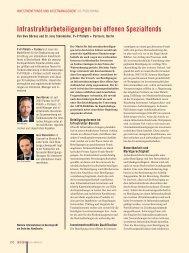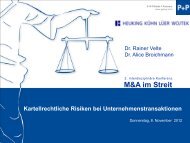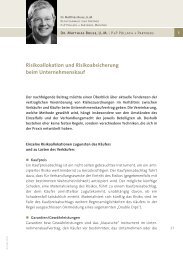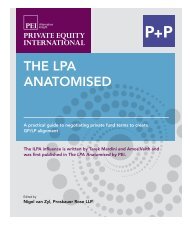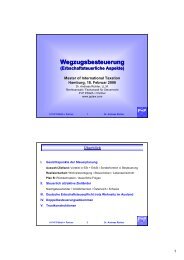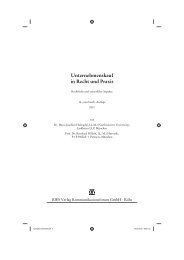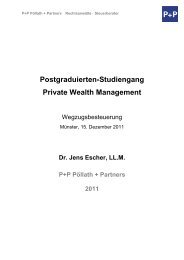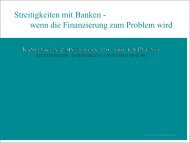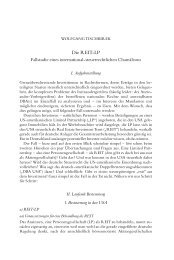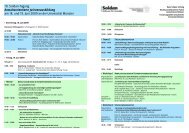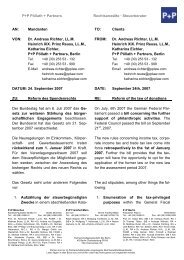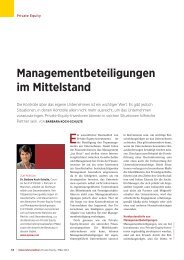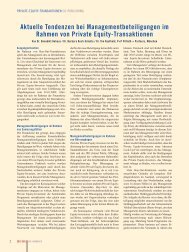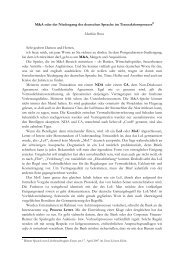Investissements étrangers en Allemagne Foreign Investments in ...
Investissements étrangers en Allemagne Foreign Investments in ...
Investissements étrangers en Allemagne Foreign Investments in ...
You also want an ePaper? Increase the reach of your titles
YUMPU automatically turns print PDFs into web optimized ePapers that Google loves.
Procédures de transaction<br />
signifie que le docum<strong>en</strong>t dans son <strong>en</strong>semble, y<br />
compris les annexes etles pièces, qui font partie de<br />
l’accord doiv<strong>en</strong>t être lus àvoix haute par oudevant<br />
le notaire (à l’exception des tableaux et listes). Par<br />
conséqu<strong>en</strong>t, prévoyez une journée <strong>en</strong>tière pour la<br />
« signature »d’un acte de v<strong>en</strong>te SPA cont<strong>en</strong>ant de<br />
nombreuses pièces soumises au droit allemand!<br />
Les <strong>in</strong>vestisseurs étrangers y échapp<strong>en</strong>t souv<strong>en</strong>t<br />
<strong>en</strong> y<strong>en</strong>voyant leurs avocats avec unpouvoir. Il est<br />
ànoter que pour certa<strong>in</strong>s actes (comme une augm<strong>en</strong>tation<br />
de capital d’une GmbH etunachat immobilier),<br />
le pouvoir de l’avocat doit lui aussi être<br />
notarié.<br />
Les frais de notaire allemand sont des frais qui<br />
obéiss<strong>en</strong>t àunbarème non négociable etobligatoire,<br />
calculés sur la valeur de la transaction. En<br />
conséqu<strong>en</strong>ce, ils vont de 10 EUR (par exemple<br />
pour l’auth<strong>en</strong>tification d’un acte de v<strong>en</strong>te (SPA) de<br />
200 pages d’une GmbH très <strong>en</strong>dettée, v<strong>en</strong>due à1<br />
EUR) à un maximum de 55 000 EUR (pour une<br />
transaction d’une valeur de 60000 000 EUR ou<br />
plus, même si l’acte de v<strong>en</strong>te (SPA) est de 5<br />
pages). Les frais de notaire sont traditionnellem<strong>en</strong>t<br />
supportés par l’acquéreur. Af<strong>in</strong> d’éviter les coûteux<br />
frais de notaire, les parties avai<strong>en</strong>t l’habitude de<br />
« fuir »<strong>en</strong>Suisse pour faire auth<strong>en</strong>tifier leurs contrats<br />
dev<strong>en</strong>te (SPA) par un notaire suisse (qui est<br />
autorisé à négocier <strong>en</strong> fonction de la charge de<br />
travail, et ne facture qu’une partie des frais allemands).<br />
Il convi<strong>en</strong>t de noter que cette pratique est<br />
impossible pour les transactions immobilières (pour<br />
lesquelles une auth<strong>en</strong>tification par un notaire allemand<br />
est obligatoire pour letransfert de propriété)<br />
et est dev<strong>en</strong>ue mo<strong>in</strong>s courante <strong>en</strong> ce qui concerne<br />
des actions deGmbH après certa<strong>in</strong>s am<strong>en</strong>dem<strong>en</strong>ts<br />
apportés àlaGmbHG <strong>en</strong> novembre 2008.<br />
5. Standards ess<strong>en</strong>tiels etlapratique de<br />
marché<br />
En substance, les contrats dev<strong>en</strong>te (SPA) soumis<br />
au droit allemand ont les mêmes standards que<br />
ceux utilisés ailleurs (bi<strong>en</strong> que souv<strong>en</strong>t, c<strong>en</strong>esoit<br />
pas le cas ni dans le style, nidans la formulation).<br />
Lors de la lecture des contrats de v<strong>en</strong>te (SPA)<br />
soumis au droit allemand, les <strong>in</strong>vestisseurs étrangers<br />
peuv<strong>en</strong>t être perturbés par ladist<strong>in</strong>ction <strong>en</strong>tre<br />
la v<strong>en</strong>te et le transfert de propriété, décrits dans<br />
deux contrats différ<strong>en</strong>ts. La « v<strong>en</strong>te » est<br />
l’obligation de transférer les actions, alors que le<br />
transfert de propriété est latransmission dutitre. La<br />
même chose s’applique pour lav<strong>en</strong>te et le transfert<br />
de propriété (cf. B.III.4.). Le transfert (mais pas la<br />
v<strong>en</strong>te) est habituellem<strong>en</strong>t soumis àla condition du<br />
paiem<strong>en</strong>t préalable du prix delav<strong>en</strong>te. Dans les<br />
cas oùundossier antitrust est exigé, le transfert<br />
(mais non la v<strong>en</strong>te) est soumis àl’autorisation des<br />
Transaction Procedures<br />
any ancillary agreem<strong>en</strong>ts related thereto and<br />
<strong>in</strong>clud<strong>in</strong>g any exhibits, which are substantially part<br />
of the agreem<strong>en</strong>t (other than lists and tables, as to<br />
which an exception applies) must be read aloud<br />
by or <strong>in</strong> front of the notary. Therefore, allow a<br />
whole day for "sign<strong>in</strong>g" ofadetailed German law<br />
SPA conta<strong>in</strong><strong>in</strong>g many exhibits! <strong>Foreign</strong> <strong>in</strong>vestors<br />
oft<strong>en</strong> avoid this by s<strong>en</strong>d<strong>in</strong>g their German lawyers<br />
with apower of attorney. Note that for some purposes<br />
(such as capital <strong>in</strong>creases <strong>in</strong> GmbHs and<br />
real estate purchases) the power of attorney itself<br />
needs tob<strong>en</strong>otarized.<br />
German notary fees are governed byamandatory,<br />
non-negotiable fee schedule and are calculated<br />
on the basis of transaction value. Accord<strong>in</strong>gly,<br />
they range from EUR 10 (e.g. for the notarization<br />
of a200 page SPA <strong>in</strong>volv<strong>in</strong>g the purchase of a<br />
heavily <strong>in</strong>debted GmbH for EUR 1) to amaximum<br />
amount of approximately EUR 55,000 (at atransaction<br />
value ofEUR 60,000,000 or more, ev<strong>en</strong> if<br />
the SPA is only five pages long). Notary fees are<br />
customarily borne by the purchaser. In order to<br />
avoid the costly German notary fees, parties used<br />
to "flee" toSwitzerland to have SPAs notarized by<br />
Swiss notaries (who are allowed tonegotiate fees<br />
<strong>in</strong> accordance with the actual work load and usually<br />
charge only afraction ofthe German fees). Note<br />
that this practice is impossible for real estate<br />
transactions (for which notarization byaGerman<br />
notary is mandatory for the transfer of ownership)<br />
and has become less common with regard to<br />
GmbH shares follow<strong>in</strong>g certa<strong>in</strong> am<strong>en</strong>dm<strong>en</strong>ts of<br />
the GmbHG <strong>in</strong> November 2008.<br />
5. Substantive Standards and Market<br />
Practice<br />
In substance (although oft<strong>en</strong> not <strong>in</strong> style and<br />
word<strong>in</strong>g) German law SPAs are similar to standards<br />
used elsewhere. Wh<strong>en</strong> read<strong>in</strong>g German<br />
SPAs, foreign <strong>in</strong>vestors may be confused by the<br />
dist<strong>in</strong>ction betwe<strong>en</strong> the sale and the transfer which<br />
are described as two separate transactions. The<br />
"sale" constitutes the obligation to transfer the<br />
share while the transfer constitutes the actual<br />
passage of title. The same applies for the sale and<br />
the conveyance of property (see above B.III.4.).<br />
The transfer (but not the sale) is usually subject to<br />
the condition preced<strong>en</strong>t of paym<strong>en</strong>t of the purchase<br />
price. Incases <strong>in</strong> which antitrust fil<strong>in</strong>g requirem<strong>en</strong>ts<br />
apply, the transfer (but not the sale)<br />
must besubject toantitrust clearance. Atypical<br />
German SPA conta<strong>in</strong>s the sale as well as the<br />
transfer but the transfer may be subject tocerta<strong>in</strong><br />
34



